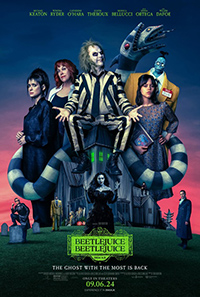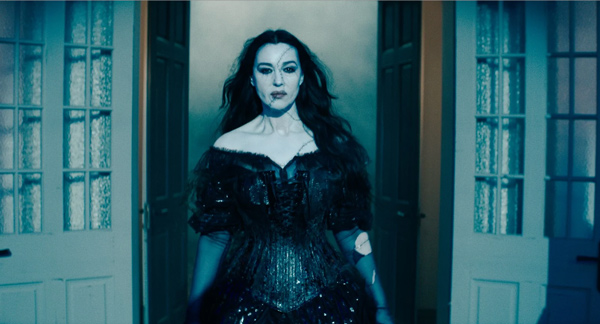Juice Cocktail: Burton Revamps His First Demon
 There’s no way to reproduce the imaginative awe of Tim Burton’s 1988 idiosyncratic goth YA classic Beetlejuice. Or, for that matter, any of Burton’s exceptionally weird but trailblazing offerings through the 1980s and 1990s, including his first two Batman films, Edward Scissorhands (1990) and Ed Wood (1994). He lionized Michael Keaton and gave us Winona Ryder as the Gen-X pin-up girl who made brooding cynicism a living, breathing sensibility, the likes of which would only be equaled in animated form by Daria. But he’s an iconoclast whose favored themes and tactics suffered mightily when CGI poisoned his tangible alchemies, and his counter culture worldview eventually became rote.
There’s no way to reproduce the imaginative awe of Tim Burton’s 1988 idiosyncratic goth YA classic Beetlejuice. Or, for that matter, any of Burton’s exceptionally weird but trailblazing offerings through the 1980s and 1990s, including his first two Batman films, Edward Scissorhands (1990) and Ed Wood (1994). He lionized Michael Keaton and gave us Winona Ryder as the Gen-X pin-up girl who made brooding cynicism a living, breathing sensibility, the likes of which would only be equaled in animated form by Daria. But he’s an iconoclast whose favored themes and tactics suffered mightily when CGI poisoned his tangible alchemies, and his counter culture worldview eventually became rote.
Now, over thirty years after his sophomore film became a generational highpoint in American mainstream cinema, Burton returns with Beetlejuice Beetlejuice, with most of his main principles gamely intact. It’s also only the second sequel Burton’s directed (the last being 1992’s Batman Returns), and a nostalgia obsessed American film industry has turned its gaze towards the slippery demon who desired to marry a teenage girl so he could wreak havoc on earth. Working with his Wednesday scribes Alfred Gough and Miles Millar, along with Seth Grahame-Smith (who co-write 2012’s Dark Shadows), he’s created a kitschy return for his infamous bio-exorcist. Filled with chuckles regarding the various odds and ends which make up a haphazard, inconsequential narrative, the spirit is definitely there. Burton turns on the juice to see what shakes loose, but it’s hard not to believe something a bit more concise wasn’t possible.
Danny Elfman’s iconic score guides us through the opening credits to the image of Lydia Deetz (Ryder), like Norma Bates, a shadowy image in the window of the recreated Ghost House home made prolific decades prior in Winter River, Connecticut. She’s now a famous television personality who investigates haunted houses, communing with the spirits plaguing stressed out homeowners. Her manager, Rory (Justin Theroux), aims to marry her, and tries to control her predilection for pills. Lydia’s filming is interrupted by a vision of Betelgeuse (Keaton), which coincides with a call from her step-mother Delia (Catherine O’Hara) that her father has died. Picking up her daughter Astrid (Jenna Ortega) from school, it’s clear mother and daughter have a strained relationship, mostly due to Lydia being unable to consort with Astrid’s dead father, who died on a trek in the Amazon some years prior. During the wake for her grandpa, Rory proposes to Lydia, asking her to marry him on Halloween, just two nights away. Fleeing the scene on bicycle, Astrid runs into a handsome, Dostoevsky loving young man named Jeremy (Arthur Conti), and he asks her out on a Halloween date at his home.

Meanwhile, in the midst of all the Deetz drama, Betelgeuse’s ex, Delores (Monica Bellucci), a soul-sucking dismembered succubus who was once married to him, is allowed to reassemble herself after an inept janitor in the After Life (Danny Devito) causes an electrical accident. She’s on the hunt to reclaim her husband.
Keaton, as he did in 1988, seems to be reveling in the vocal work and physicality of the zany demon, still desiring to marry Lydia and return to the land of the living. He arrives replete with his own goofy zingers, effortlessly elevating the film’s energy whenever he’s on screen. But he seems like a supporting character between all these competing energies. Perhaps by a potential third film (which would seem likely depending on box office returns), Beetlejuice Beetlejuice Beetlejuice might bring him back in full force.
Ryder is nearly a non-entity as Lydia, defined solely through her inabilities to mother Astrid, with Ortega playing the watered down version of the Wednesday persona she previously donned for Burton. It’s as if Burton can’t quite imagine them as logical, functional beings. A saving grace, as per usual, is Catherine O’Hara, whose Delia is now a semi-notable artist with a traveling installation utilizing her own body as a canvas (a visual nod to The Crows Have Eyes from “Schitt’s Creek” floats by, under appreciated). The drama established between Lydia and Astrid tends to deaden the film’s energy, as does Ortega’s moroseness, including the budding romance she has with Jeremy prior to a plot twist which thankfully curtails the sluggish teen romance.
Death and marriage end up being the two narrative catalysts, the outline of which make for the third act showdown to feel painfully obvious well before it arrives, culminating in a compromised Halloween night wedding. The plot is absurd, which relies on a lot of chunks of exposition to explain several key characters who are absent. The first of these is Jeffrey Jones as the now deceased Charles Deetz, whose character is quite substantial here, conveniently headless in the After Life so as to avoid the casting of Jones and likely reawaken conversations regarding the actor’s criminal past which resulted in his being a registered sex offender. The other is Santiago Cabrera as a new undead character who makes an appearance in the finale but whose absence feels painstakingly tended to.
Willem Dafoe is a dead actor who specialized in playing cops, particularly in a television series called “Frank Hardballer,” now relegated to being head honcho of the After Life’s crime unit thanks to his obsession with ‘keeping it real,’ which resulted in a stunt sequence claiming his life. Dafoe is often entertaining, but Burton doesn’t give him too much to do. A worse offense is the wasting of Monica Bellucci as a Vampira knockoff reanimated like one of the women in Frank Henenlotter’s Frankenhooker (1990), a scene set to the Bee Gee’s “Tragedy.”
Speaking of music, the amusing but ultimately forgettable denouement is a fantasy lip sync sequence to “MacArthur Park,” the original Richard Harris version. Likewise, there’s an obvious and silly bit about the Soul Train, which transports newly dead souls to their After Life destination, the platform of which is populated by what seems to be mostly Black dancers dancing to funky disco as an homage to the classic television show. Rosie Perez would have made a fantastic cameo here in this “Thriller” inspired mash.
For those who felt Beetlejuice was a defining element or inspiration for their Gothic sensibilities, Beetlejuice Beetlejuice is a loving, ultimately unproductive reunion. But if we’re to have more juice, couldn’t it be 100% concentrated?
Reviewed on August 28th at the 2024 Venice Film Festival (81st edition) – Fiction – Out of Competition (opening film). 114 Minutes.
★★½/☆☆☆☆☆


